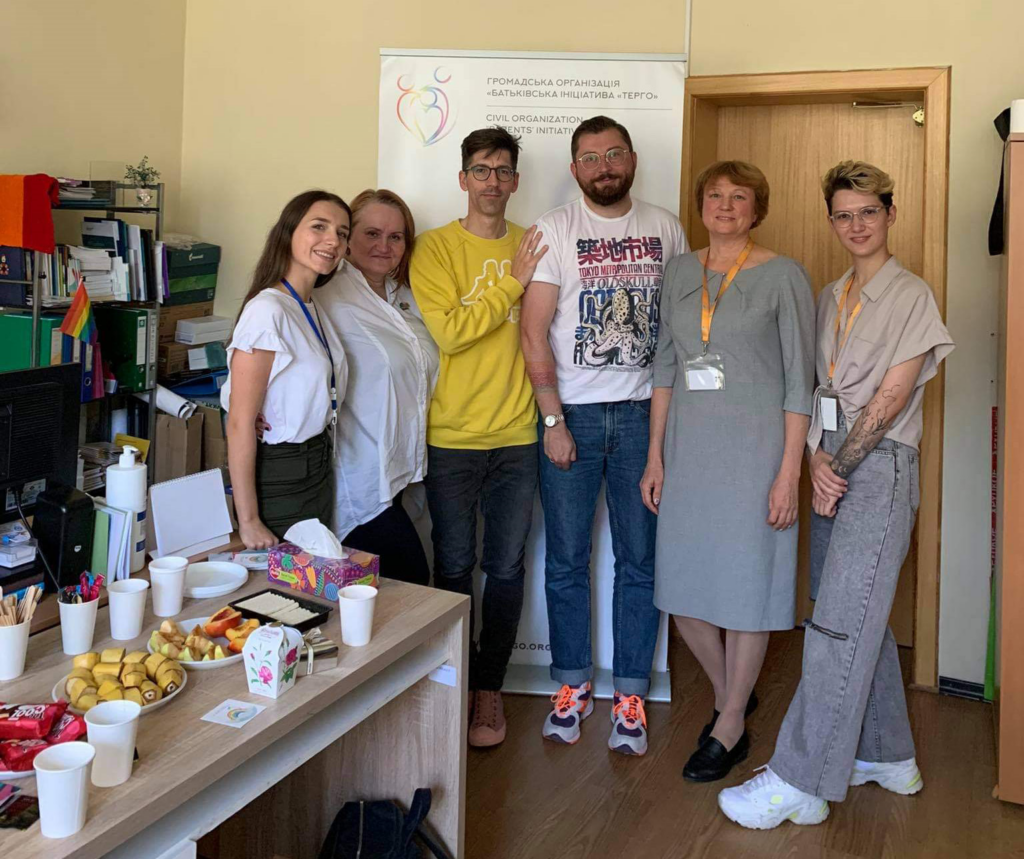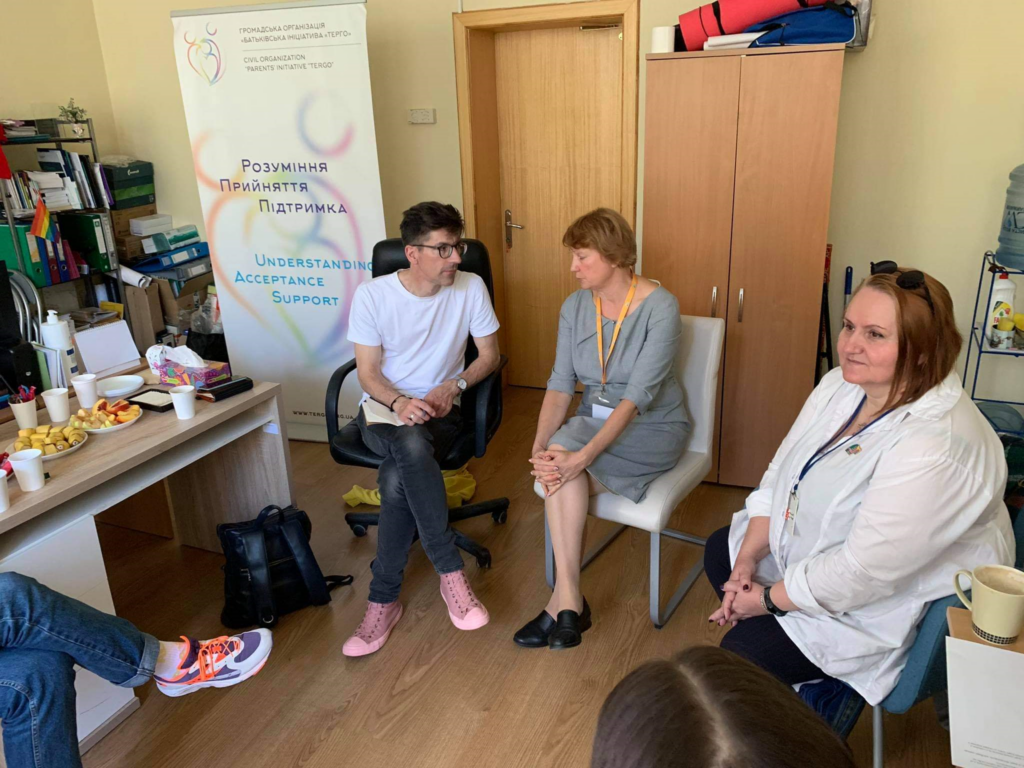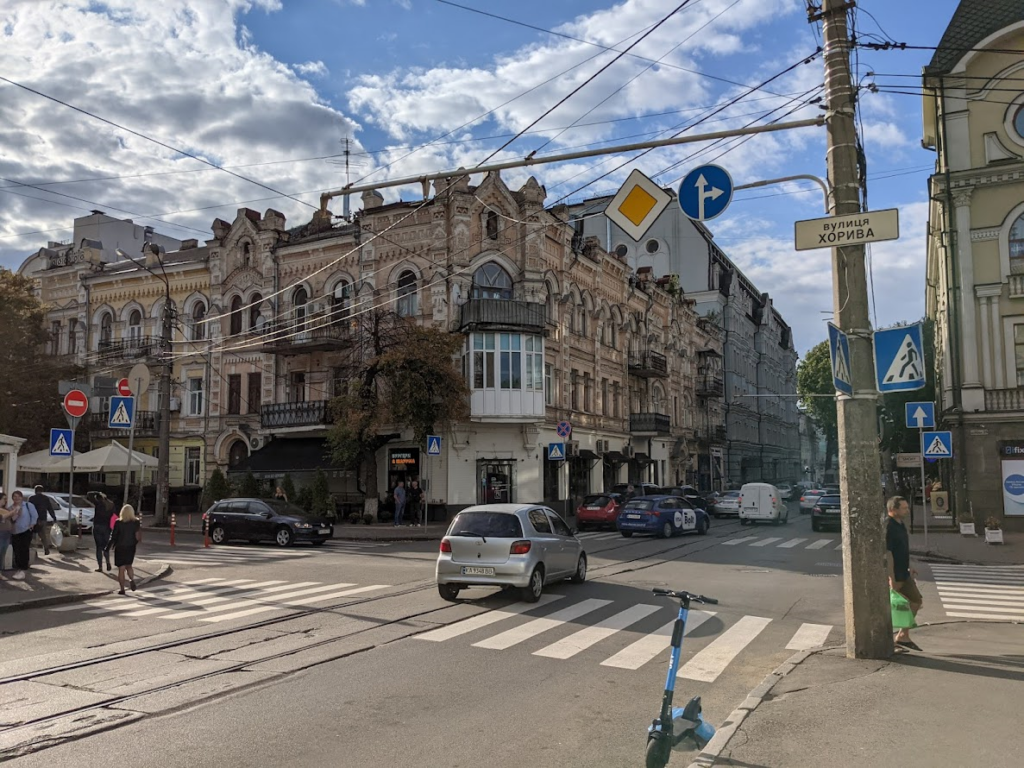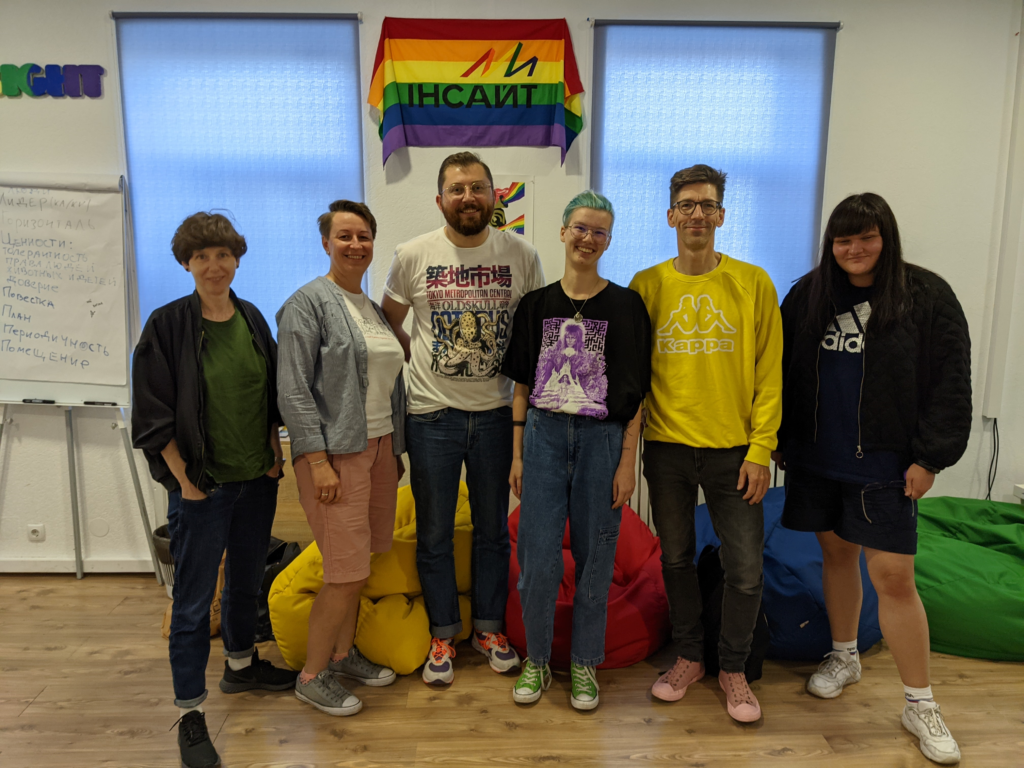PrideBlog – Bullying at school, violence in Podil
by Conrad Breyer
We’re already sitting on the bus to the next appointment when Olena Globa sends me another message on my cell phone. “LGBTIQ*,” it says, “will win thanks to people like you in Munich and Kyiv, and not because Biden and Zelensky make some agreement that’s only written on paper,” the head of the parents’ initiative TERGO writes. The sentence touches me and shows how important the commitment of every single activist is.
We had a long talk with TERGO on Thursday afternoon. We know all the mothers well around the two leaders of the organization, Olena Globa and Anna Medko, and have been working together since the beginning. After two years of the pandemic-related break, we really need the update in their office.

TERGO now focuses almost entirely on schools around the country. Of course, LGBTIQ* organizations are not welcome there; they are not even allowed in at all. But in many cities, schools do now give themselves a veneer of diversity and engage in anti-bullying programs in general. In this context, parents are often invited with their children to tell the teachers about their bullying experiences. TERGO takes advantage of this: Their daughters and sons simply talk about their experiences with homo- and trans*-phobia when asked. “Living Books” is the name of this concept, which we in Munich are now also familiar with. It works because it touches people. “It’s about acceptance,” says Olena. Teachers are always afraid of the extra workload, she says. “But you don’t need an agenda here, they just have to accept what is.”
The living books
It is great to hear how much strength and inspiration the mothers of TERGO draw from their love for their children, but how they have also been guided by the experiences of Munich’s community. Repeatedly, representatives from the organization participated in workshops in Munich like diversity@school to understand how we educate about LGBTIQ* in schools. And many of the methods we went through together – they now also use in Ukraine. This is partnership in action.

TERGO is active throughout Ukraine, visiting schools everywhere. They tell the stories of their daughters and sons on the media, launch campaigns, here and there they even work on exhibitions. A study that the organization recently conducted shows that people’s attitudes are changing as a result – even at school.
Everyone can achieve something
TERGO recently celebrated its biggest success – and Olena gets all excited when she tells it – when the municipal council of the city of Mykolayiv agreed to run an awareness campaign for TERGO that the organization developed with an advertising agency. They wrote to city councils in 21 regions of Ukraie to win them for the project, most ignored their request, some rejected it politely, only one agreed – Mykolayiv.

“The fact that you work so closely with the city council in Munich inspired us,” Olena says. And this success, she says, is historic! Olena, who translates and therefore sits next to me, enthusiastically slides back and forth on her chair. Posters now hang in Mykolaiv – though not in the center – with texts like, “Is your student gay? Talk to us.” This is a great success.
At the end, I talk to Olena about the memorandum that Joe Biden, president of the US, and Ukraine’s President Volodymyr Zelensky had recently signed when it came to cooperation between the two countries. It included a passage in which Ukraine promised to protect LGBTIQ* rights. Olena’s own son, Bogdan, who has been living in America for years and advocating for LGBTIQ* rights in Ukraine while in exile, helped initiate it. “It’s a huge success, isn’t it,” I ask. Olena nods, smiles kindly, and says, “Biden may be serious, but we don’t trust Zelensky on this.” They all think it makes more sense to go to the Pride March on Sunday. “We’re more likely to be heard there.”
Have a cake, be inspired
We say goodbye. The mothers hand over a huge box of cake and we set off to visit Insight, an organization based in Podil. It seems to me that more and more LGBTIQ* institutions are opening their offices there; friendly cafés have also settled in the neighborhood. Sounds good. But later we learn that the queer people who hang out in the neighborhood are unfortunately attacked again and again. That’s sad.

When we enter Insight’s office, I am quite amazed. The office is large, friendly, modern – it proves the success of this organization, which we have known for nine years now. At its helm is Olena Shevchenko, who has managed to guide Insight through good times and bad.
Insight engages in advocacy for LGBTIQ* rights, provides counseling services to the community, but also runs its own community center with several employees. The focus is clearly on trans* and lesbians, who need special visibility, just like at home, to make their concerns understood by a broader audience. They organize the Women’s March, the Equality Festival, the Trans* March, a Trans* Conference and are always interested in exchange with trans* communities all over the world. Munich has experienced surgeons and endocrinologists; they would be more than welcome to share their experiences in Ukraine.
Athletes for Gay Games Munich
Insight is active in nine regions and has managed to educate their donors to support them independently of projects. Most NGOs suffer from this: A project gets funded, then it runs out and the organization has to let the people it hired or mobilized go again, sometimes even moving out of rented offices. That is not sustainable.
We sit in the community room and listen to people tell us how Insight fills the community’s weekly program here: Film and game nights, theater, readings, poetry slams, discussions, creative workshops. Busok, the project manager, speaks German and is enthusiastic about the possibilities. There’s also a ping-pong table leaning against the wall. Insight has many sports-minded members who play basketball and – table tennis. I talk about Munich’s bid for the 2026 Gay Games and the planned outreach program. We also speak about Team Munich, the city’s LGBTIQ* umbrella organisation and the sports festival to which we were already planning to invite athletes from Ukraine in 2019, but then Corona came along. Insight, with its many recreational groups, offers great potential for cooperation in sports – we want to take advantage of that.
After the official meeting, when it is already dark outside, we talk for a long time with the young activists, who are bubbling over with ideas. We leave them the cake. The two of us wouldn’t have made it anyway, and they have an event tonight. Everyone is happy. Smatchnoho!
Back to overview